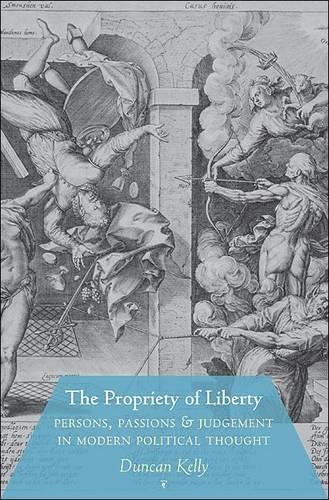
The Propriety of Liberty: Persons, Passions, and Judgement in Modern Political Thought
(Hardback)
Publishing Details
The Propriety of Liberty: Persons, Passions, and Judgement in Modern Political Thought
By (Author) Duncan Kelly
Princeton University Press
Princeton University Press
17th January 2011
United States
Classifications
Tertiary Education
Non Fiction
History of ideas
Political control and freedoms
320.011
Physical Properties
Hardback
368
Width 152mm, Height 235mm
652g
Description
In this book, Duncan Kelly excavates, from the history of modern political thought, a largely forgotten claim about liberty as a form of propriety. By rethinking the intellectual and historical foundations of modern accounts of freedom, he brings into focus how this major vision of liberty developed between the seventeenth and the nineteenth centuries. In his framework, celebrated political writers, including John Locke, Montesquieu, Adam Smith, John Stuart Mill, and Thomas Hill Green pursue the claim that freedom is best understood as a form of responsible agency or propriety, and they do so by reconciling key moral and philosophical claims with classical and contemporary political theory. Their approach broadly assumes that only those persons who appropriately regulate their conduct can be thought of as free and responsible. At the same time, however, they recognize that such internal forms of self-propriety must be judged within the wider context of social and political life. Kelly shows how the intellectual and practical demands of such a synthesis require these great writers to consider freedom as part of a broader set of arguments about the nature of personhood, the potentially irrational impact of the passions, and the obstinate problems of individual and political judgement. By exploring these relationships, "The Propriety of Liberty" not only revises the intellectual history of modern political thought, but also sheds light on contemporary debates about freedom and agency.
Reviews
"In the face of these obstacles, Kelly not only constructs a synthetic counter-narrative, he does so while embedding each writer in an almost unmanageably large body of current secondary scholarship and within the entire history of political thought. The result is an admirable demonstration of the power of intellectual history in the service of political theory... Finally, this fine work makes the larger argument that political theory must incorporate all three of its 'languages'--philosophy, history and theology--into the moral psychology of freedom."--Eldon J. Eisenach, History of Political Thought Journal "The Propriety of Liberty is a signal achievement in clarifying the contours of modern political and moral thinking about individual freedom and responsible agency in society."--Hussein Banai, Political Studies Review "This is a challenging but also deeply rewarding book. Kelly's command of the literature, the intelligence of his argument, and the level of detail that he offers are truly impressive. The book overflows with interesting insights."--Helena Rosenblatt, Journal of Modern History
Author Bio
Duncan Kelly is university senior lecturer in political theory in the Department of Politics and International Studies, University of Cambridge, and fellow of Jesus College, Cambridge. He is the author of "The State of the Political".
